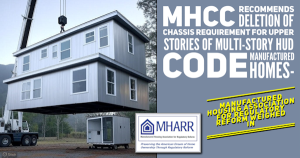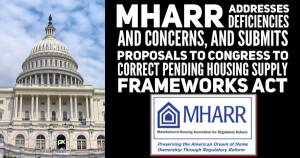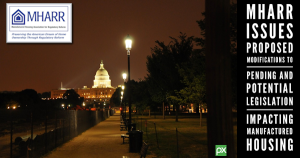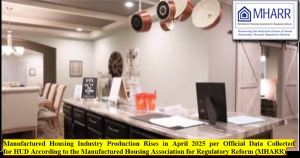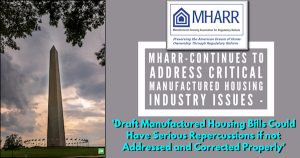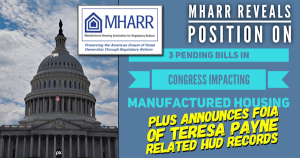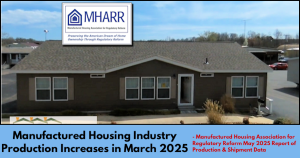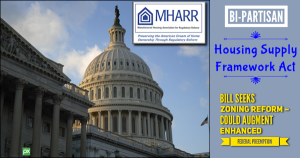MHARR SEPTEMBER 12, 2019 WASHINGTON UPDATE — AN EXCLUSIVE REPORT AND ANALYSIS
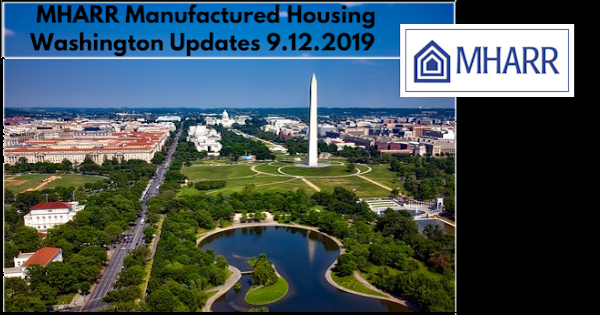
- HUD’S CONTRACTING FAVORITISM CONTINUES
- HUD AND TREASURY RELEASE HOUSING FINANCE REFORM PLANS
- FHFA ANNOUNCES SECOND DTS ROAD SHOW – MORE OF THE SAME
- ZONING PROJECT RESPONSE ILLUSTRATES POST-PRODUCTION FLAWS
- MHARR OFFICIALLY ANNOUNCES NEW WEBSITE
HUD AWARDS DAPIA MONITORING CONTRACT TO 40-YEAR INCUMBENT
MHARR has learned near press time that the new HUD monitoring contract for DAPIA monitoring services, has been awarded once again to the 40-year-plus incumbent contractor, the Institute for Building and Technology Services (IBTS). IBTS is the only entity to have held all – or any part – of the HUD contract for manufactured housing monitoring services since the inception of the contract and the federal manufactured housing program at HUD, more than 40 years ago, often being selected through non-competitive solicitations which MHARR has contended were tailored for the specific benefit and advantage of IBTS. To date, no informationhas been published or released regarding the status of the separate HUD contract solicitation for IPIA monitoring services. The IPIA monitoring solicitation and contract, even though formally separated from the DAPIA services solicitation and contract for the first time in the present bidding process, was nevertheless open to bidding by parties that also bid on the DAPIA monitoring contract, and could likewise be awarded to IBTS, in violation of both the letter and clear intent of the Manufactured Housing Improvement Act of 2000. Such continuing favoritism and bias at HUD – which the 2000 reform law, insubstantial part, was designed to correct – mustend if the affordability of manufactured housing is to be preserved and both the program and the industry are to meet their full potential.
While some details are not yet known, it is known that at least one other entity had submitted a bid for the DAPIA services contract which, as awarded to IBTS, is valued at $7,611,083.66 for a time period that is not specified in the award announcement.
Regardless, though, of the exact number of other bidders for the DAPIA contract and/or the amount of any other bids, the continuation of a defacto40-year-plus monopoly and stranglehold on all or part of the manufactured housing monitoring function is unacceptable and an indefensible sham. As MHARR informed both HUD Assistant Secretary Brian Montgomery and HUD Assistant Chief Procurement Officer Jimmy Scott in meetings earlier this year, and has previously asserted in both written and verbal testimony before Congress, this sham contracting process and the resulting 40-year symbiotic relationship between the HUD program and a private contractor infects (and affects) nearly every aspect of the HUD manufactured housing program – including, but not limited to, standards and regulatory interpretations, the development of new or modified standards or regulations, and multiple aspects of the in-plant enforcement process – all in violation of the 2000 reform law. In 2012 congressional testimony, MHARR emphasized the resoundingly negative impact of this contract favoritism as follows:
“Without new ideas and thinking the program, effectively, remains frozen in the 1970’s and has not evolved along with the industry. This is one of the primary reasons that the federal program, government at all levels and other organizations and entities continue to view and treat manufactured homes as “trailers,” causing untold difficulties for the industry and consumers, including financing, zoning, placement and other issues. The [Manufactured Housing Improvement Act of 2000], moreover, was designed to assure a balance between reasonable consumer protection and affordability. But the HUD program and the entrenched incumbent contractor have a history of continually ratcheting-up regulation, with more detailed, intricate and costly procedures, inspections, record-keeping, reports and red-tape, despite the fact that consumer complaints regarding manufactured homes, as shown by HUD’s own data, are minimal. This is a result, in part, of an enforcement and contracting structure that provides an incentive for the monitoring contractor to find fault with manufactured homes. For the manufactured housing industry to recover and advance from the decline of the past 13 years, this cycle must be broken ….”
Based on the regulatory reform policies of the Trump Administration, MHARR has – and will continue to maintain — that this vicious cycle of contract awards to the same entity — an entity which has sought to endlessly expand debilitating and costly regulation that offers little or no benefit to actual consumers, must end. And, in fact, by recommending the appointment – finally — of a non-career official to lead the HUD manufactured housing program in accordance with the express mandate of the 2000 reform law (see, article below), Secretary Carson has taken a necessary first step in addressing and ultimately resolving the lingering biases among career HUD employees which have led to such a successive string of effectively non-competitive contract awards. This change in thinking, however, apparently comes too late for the present solicitations, which still bear all the hallmarks of HUD career employees who simply refuse to depart – in any way – from the practices of over four decades, sustained and effectively supported by part of the industry (representing the industry’s largest corporate conglomerates), which has simply gone-along with the present indefensible system that denies the industry and consumers any new thinking regarding federal manufactured housing regulation and enforcement for more than two generations.
MHARR, by contrast, will continue to seek the full implementation of the “separate and independent” contractors mandate of the 2000 reform law and a HUD manufactured housing program contracting process that is stripped of the favoritism and bias of the past 40 years.
HUD AND TREASURY DEPARTMENT ANNOUNCE HOUSING FINANCE PLANS
Both the U.S. Department of Housing and Urban Development (HUD) and the U.S. Treasury Department, have released detailed plans for legislative and statutory reforms to the U.S. consumer housing finance system. Covering, respectively, housing finance activities by the Federal Housing Administration (FHA) and Government National Mortgage Association (GNMA) on the one hand, and Fannie Mae and Freddie Mac on the other, these reports were issued almost simultaneously after the close of business on September 5, 2019. While the Treasury report is primarily focused on “big picture” reforms, including termination of the federal conservatorship of both Fannie Mae and Freddie Mac (that will have collateral impacts on the manufactured housing consumer finance market), the HUD report includes specific, directrecommendations concerning HUD Code manufactured housing and proposed reforms – including reforms aggressively advanced by MHARR — addressing several key aspects of the federal manufactured housing program and the full implementation of the Manufactured Housing Improvement Act of 2000.
Specifically, the HUD report includes a section on “Eliminating Regulatory Barriers to Affordable Housing Including Manufactured Housing.” Acknowledging the “vital role” that manufactured housing plays “in meeting the nation’s affordable housing needs,” the HUD report sets forth four “Administrative Reforms” which expressly reference HUD Code manufactured housing. These report accordingly, recommends that:
- “HUD should elevate the Office of Manufactured Housing Programs within HUD and appoint a Deputy Assistant Secretary to lead it.”
- “HUD should devote resources to ensure that the HUD Code is modernized to incorporate standards recommended by the MHCC [e., Manufactured Housing Consensus Committee], to minimize overly burdensome regulatory and compliance requirements, and to encourage innovation.”
- “To encourage innovation in manufactured housing, HUD should create a formal framework for identifying and evaluating new building, construction and design developments and ensuring that HUD’s regulations do not unnecessarily impede their adoption.”
In addition, with specific reference to FHA and manufactured housing consumer financing, the report recommends that “FHA should consider innovative proposals to modify single-family housing mortgage finance underwriting to further encourage and promote additional supply of entry-level housing, particularly manufactured housing.” (Emphasis added).
While the first three of these proposed reforms – focused on the federal manufactured housing program — would implement and/or reinforce the implementation of key aspects of the Manufactured Housing Improvement Act of 2000, as consistently and tirelessly sought be MHARR since the enactment of this law, and are thus a welcome step by HUD Secretary Ben Carson, they nevertheless fail to address two other crucial elements of the 2000 reform law which mustbe implemented to both fully reform the federal program as envisaged by Congress and to ensure the availability of affordable manufactured housing for all Americans, namely full compliance with the “separate and independent” contractors mandate of the 2000 law and robust enforcement of the enhanced preemption provision of the 2000 reform law to invalidate zoning and placement restrictions that discriminatorily exclude or severely restrict the placement of manufactured homes and manufactured housing communities. HUD’s reform proposals, therefore, while positive and encouraging, are nevertheless incomplete and should be supplemented with additional actions to address these two remaining issues.
As to the present proposals, while MHARR, in meetings with HUD officials and comments filed pursuant to Trump Administration Executive Orders 13771 and 13777, has called on the Department to eliminate existing pseudo-regulatory mandates and has always urged the Department to work with and through the MHCC to encourage innovation and the technical evolution of affordable manufactured housing, it has made a particular point of seeking a return to the express mandate of the 2000 reform law, which directs HUD to appoint a non-career administrator to lead the federal manufactured housing program. The 2000 reform law adopted this change in order: (1) to ensure the visibility of the program within HUD and to ensure the inclusion of HUD Code manufactured housing in all relevant programs and activities; (2) to ensure political accountability for program actions and decisions; and (3) to ensure proper oversight of both program career personnel and contractors. MHARR, moreover, has made it clear that fullcompliance with this mandate – and with all other reform provisions of the 2000 law – is a fundamental issue that will not simply go away. With this persistence and now with this recommendation, it appears that HUD may finally be ready to comply with this essential reform element of the 2000 law after years of ignoring it. MHARR, accordingly, will seek to ensure that a non-career appointed administrator is, in fact, designated to lead the federal program.
In addition, the HUD report’s recommendation to FHA to consider innovative changes to its underwriting practices to “encourage and promote” the use of manufactured homes as entry-level housing is fully consistent with MHARR’s regular calls – before both HUD and Congress — for the re-vitalization of the FHA Title I (personal property) manufactured housing program in particular, and for the termination or modification of the GNMA 10-10 policy that has severely limited the number of lenders permitted to participate in manufactured housing consumer lending activity. Indeed, under the current highly-restricted system, FHA involvement in manufactured home consumer lending/support has become almost non-existent.
MHARR, therefore, will continue to seek an active FHA role in the manufactured housing consumer lending market with market-significant volumes that will spur both the availability of affordable manufactured homes for first-time homebuyers and the broader growth of the HUD Code manufactured housing market.
FHFA ANNOUNCES SECOND ROUND OF DTS “LISTENING SESSIONS” – WILL CALABRIA SEEK POSITIVE RESULTS?
The Federal Housing Finance Agency (FHFA) has announced a second series of “listening sessions” relating to the development of new, 2021-2023 Duty to Serve (DTS) “compliance plans” by both Fannie Mae and Freddie Mac. The sessions, currently scheduled to be held between November 19, 2019 and December 11, 2019 mirror the “listening” tour conducted by FHFA several years ago in connection with the initial DTS plans developed by the Government Sponsored Enterprises (GSEs). Those initial plans, as MHARR has repeatedly emphasized, have – some 11 years after the enactment of DTS — failed to achieve the primary and fundamental goals of the DTS law with respect to the manufactured housing market. Instead, they have been twisted and distorted in order to prioritize a “new type” or “new class” of more costly manufactured home – to meet the preferences of the GSEs, rather than the lower and moderate-income homebuyers that rely on affordable manufactured housing – while little or nothing has been done to better serve mainstream manufactured housing and most particularly, the nearly 80% of manufactured homes financed through personal property loans. Consequently, as MHARR noted in its recent meeting with new FHFA Director, Mark Calabria, it is essential– at a minimum — that the next round of DTS compliance plans achieve market-significant results for all elements of the existing manufactured housing market, and most particularly for the vast bulk of the HUD Code market that is served by personal property loans.
Accordingly, MHARR plans to participate in the new round of listening sessions in order to press for the full, market-significant implementation of DTS with respect to manufactured housing personal property loans. Given the fact that the GSEs have supposedly spent the entirety of their initial, three-year, DTS “compliance plans” seeking and gathering data on the performance characteristics of HUD Code personal property loans – data which they allegedly were not able to access from existing private-sector lenders, including, but not limited to, the finance subsidiaries of Clayton Homes, Inc. – there presumably should be no legitimate reason for either Fannie Mae or Freddie Mac to refuse further entry into those markets, ultimately leading to full-scale, market-significant participation in the personal property segment of the manufactured housing consumer finance market. MHARR, consequently, will continue to aggressively seek market-significant securitization and secondary market support by the GSEs for manufactured home personal property loans on the existing types of manufactured homes (and not just a so-called “new class” of more costly home). As MHARR has noted frequently in its engagement with Congress, FHFA and the GSEs on this matter, the DTS mandate, bydefinition, cannot be met and cannot be satisfied, unless and until both Fannie Mae and Freddie Mac fullyserve the personal property lending market for all existing types of HUD Code manufactured housing which can be readily securitized.
In addition to participation in these “listening sessions,” MHARR will continue other means of engagement with both FHFA and Congress in order to seek the full market-significant implementation of allaspects of DTS for existing, mainstream, HUD Code manufactured housing.
ZONING PROJECT RESPONSE UNDERSCORES POST-PRODUCTION FLAWS
MHARR is currently analyzing responses to its May 15, 2019 effort to collect information from state associations regarding particularly egregious cases of exclusionary and discriminatory zoning against both individual manufactured home placements and the development of new HUD Code communities (or the expansion of existing communities). This initiative was authorized by the MHARR Board of Directors at its March 29, 2019 meeting and offered MHARR support in litigation over actionable zoning cases designed to seek and obtain favorable judicial (and/or administrative precedents) that could then be asserted in other jurisdictions to: (1) stem the tide of baseless restrictions on the placement of manufactured homes (absent a more aggressive assertion of enhanced federal preemption by HUD, which MHARR has sought continuously since enactment of the Manufactured Housing Improvement Act of 2000); and (2) to expand the availability of modern, affordable manufactured homes in accordance with federal law.
While exclusionary zoning and related placement restrictions – as noted by the MHARR Board – are and have been a major factor in the suppression of the HUD Code manufactured housing market over the past decade-plus and are similarly a factor in failure of the HUD Code market to grow and expand, notwithstanding a well-documented housing crisis which particularly impacts first-time homebuyers and lower and moderate-income consumers, the response to MHARR’s offer of no-strings legal support has been minimal, with no response at all from most state associations and only “historical” (i.e., not currently actionable) information from others. Still others forwarded MHARR’s request to private parties, contrary to MHARR’s offer and request to work specifically in conjunction with the industry’s official collective representative in each relevant state (i.e., the industry state associations).
This lack of response runs directly counter to regular and frequent reports of actions taken by localities in multiple states to either totally exclude federally-regulated manufactured housing or to severely restrict its placement and utilization and is indicative of a broader problem within the industry’s post-production sector (where this problem, by definition, resides). At best, it shows a level of complacency that is difficult to explain and even more difficult to justify. At worst it represents a major failure of the industry’s post-production representation on a national level, with extremely damaging repercussions for all segments of the industry.
Given the investment of time and effort in this matter by MHARR thus far, and given the fundamental importance of this issue (in conjunction with continuing limitations on the availability of consumer financing for HUD Code manufactured homes), MHARR will complete its review and analysis of the available information relevant to its inquiry and will address this issue further in a White Paper to be published soon in an “MHARR Issues and Perspectives” column.
Nevertheless, the long-term erosion in market-presence and market size which is attributable to zoning exclusions and restrictions, and the lack of available consumer financing, together with the corresponding consolidation of production within the industry – all to the detriment of American consumers of affordable housing and smaller industry businesses – is an issue that will not and, indeed, cannot go away, and MHARR will continue to pursue efforts to effectivelyaddress these matters for the benefit of both the industry and American consumers of affordable housing.
MHARR ANNOUNCES NEW WEBSITE
MHARR has announced the establishment of its new internet website, which can be accessed at www.manufacturedhousingassociation.org.
The MHARR website – which unlike those of other national industry associations, will be open to both members and the public on an equal access basis without membership “walls” – will feature factual and accurate regulatory comments and correspondence, industry trade press articles, production reports and other news and information pertaining to the manufactured housing industry and MHARR’s efforts in Washington, D.C. on behalf of the HUD Code industry’s smaller businesses.
The website, among other things, will highlight the benefits and advantages of inherently affordable manufactured homes. It will also provide factual and accurate information for elected officials, federal decision-makers, other industry members and the public at large regarding MHARR’s ongoing efforts to ensure fair and reasonable regulation of the industry, financing parity with other types of housing, the inclusion of manufactured homes in all relevant government housing programs, and the availability of durable, high-quality manufactured homes for Americans at every rung of the economic ladder.
MHARR’s website will be updated with new information on a regular basis, and will fill what is now a significant void for the industry, government and elected officials, and the public at large, in that it will offer specific, detailed and accurate information on key regulatory and related issues from the unique perspective of the industry’s traditional core of smaller businesses.
MHARR is a Washington, D.C.-based national trade association representing the views and interests of independent producers of federally-regulated manufactured housing.
The “MHARR Washington Update” and articles therein are available for re-publication in full (i.e., without alteration or substantive modification) without further permission and with proper attribution to MHARR.
MHARR SEPTEMBER 12, 2019 WASHINGTON UPDATE — AN EXCLUSIVE REPORT AND ANALYSIS-pdf
- HUD’S CONTRACTING FAVORITISM CONTINUES
- HUD AND TREASURY RELEASE HOUSING FINANCE REFORM PLANS
- FHFA ANNOUNCES SECOND DTS ROAD SHOW – MORE OF THE SAME
- ZONING PROJECT RESPONSE ILLUSTRATES POST-PRODUCTION FLAWS
- MHARR OFFICIALLY ANNOUNCES NEW WEBSITE
HUD AWARDS DAPIA MONITORING CONTRACT TO 40-YEAR INCUMBENT
MHARR has learned near press time that the new HUD monitoring contract for DAPIA monitoring services, has been awarded once again to the 40-year-plus incumbent contractor, the Institute for Building and Technology Services (IBTS). IBTS is the only entity to have held all – or any part – of the HUD contract for manufactured housing monitoring services since the inception of the contract and the federal manufactured housing program at HUD, more than 40 years ago, often being selected through non-competitive solicitations which MHARR has contended were tailored for the specific benefit and advantage of IBTS. To date, no informationhas been published or released regarding the status of the separate HUD contract solicitation for IPIA monitoring services. The IPIA monitoring solicitation and contract, even though formally separated from the DAPIA services solicitation and contract for the first time in the present bidding process, was nevertheless open to bidding by parties that also bid on the DAPIA monitoring contract, and could likewise be awarded to IBTS, in violation of both the letter and clear intent of the Manufactured Housing Improvement Act of 2000. Such continuing favoritism and bias at HUD – which the 2000 reform law, insubstantial part, was designed to correct – mustend if the affordability of manufactured housing is to be preserved and both the program and the industry are to meet their full potential.
While some details are not yet known, it is known that at least one other entity had submitted a bid for the DAPIA services contract which, as awarded to IBTS, is valued at $7,611,083.66 for a time period that is not specified in the award announcement.
Regardless, though, of the exact number of other bidders for the DAPIA contract and/or the amount of any other bids, the continuation of a defacto40-year-plus monopoly and stranglehold on all or part of the manufactured housing monitoring function is unacceptable and an indefensible sham. As MHARR informed both HUD Assistant Secretary Brian Montgomery and HUD Assistant Chief Procurement Officer Jimmy Scott in meetings earlier this year, and has previously asserted in both written and verbal testimony before Congress, this sham contracting process and the resulting 40-year symbiotic relationship between the HUD program and a private contractor infects (and affects) nearly every aspect of the HUD manufactured housing program – including, but not limited to, standards and regulatory interpretations, the development of new or modified standards or regulations, and multiple aspects of the in-plant enforcement process – all in violation of the 2000 reform law. In 2012 congressional testimony, MHARR emphasized the resoundingly negative impact of this contract favoritism as follows:
“Without new ideas and thinking the program, effectively, remains frozen in the 1970’s and has not evolved along with the industry. This is one of the primary reasons that the federal program, government at all levels and other organizations and entities continue to view and treat manufactured homes as “trailers,” causing untold difficulties for the industry and consumers, including financing, zoning, placement and other issues. The [Manufactured Housing Improvement Act of 2000], moreover, was designed to assure a balance between reasonable consumer protection and affordability. But the HUD program and the entrenched incumbent contractor have a history of continually ratcheting-up regulation, with more detailed, intricate and costly procedures, inspections, record-keeping, reports and red-tape, despite the fact that consumer complaints regarding manufactured homes, as shown by HUD’s own data, are minimal. This is a result, in part, of an enforcement and contracting structure that provides an incentive for the monitoring contractor to find fault with manufactured homes. For the manufactured housing industry to recover and advance from the decline of the past 13 years, this cycle must be broken ….”
Based on the regulatory reform policies of the Trump Administration, MHARR has – and will continue to maintain — that this vicious cycle of contract awards to the same entity — an entity which has sought to endlessly expand debilitating and costly regulation that offers little or no benefit to actual consumers, must end. And, in fact, by recommending the appointment – finally — of a non-career official to lead the HUD manufactured housing program in accordance with the express mandate of the 2000 reform law (see, article below), Secretary Carson has taken a necessary first step in addressing and ultimately resolving the lingering biases among career HUD employees which have led to such a successive string of effectively non-competitive contract awards. This change in thinking, however, apparently comes too late for the present solicitations, which still bear all the hallmarks of HUD career employees who simply refuse to depart – in any way – from the practices of over four decades, sustained and effectively supported by part of the industry (representing the industry’s largest corporate conglomerates), which has simply gone-along with the present indefensible system that denies the industry and consumers any new thinking regarding federal manufactured housing regulation and enforcement for more than two generations.
MHARR, by contrast, will continue to seek the full implementation of the “separate and independent” contractors mandate of the 2000 reform law and a HUD manufactured housing program contracting process that is stripped of the favoritism and bias of the past 40 years.
HUD AND TREASURY DEPARTMENT ANNOUNCE HOUSING FINANCE PLANS
Both the U.S. Department of Housing and Urban Development (HUD) and the U.S. Treasury Department, have released detailed plans for legislative and statutory reforms to the U.S. consumer housing finance system. Covering, respectively, housing finance activities by the Federal Housing Administration (FHA) and Government National Mortgage Association (GNMA) on the one hand, and Fannie Mae and Freddie Mac on the other, these reports were issued almost simultaneously after the close of business on September 5, 2019. While the Treasury report is primarily focused on “big picture” reforms, including termination of the federal conservatorship of both Fannie Mae and Freddie Mac (that will have collateral impacts on the manufactured housing consumer finance market), the HUD report includes specific, directrecommendations concerning HUD Code manufactured housing and proposed reforms – including reforms aggressively advanced by MHARR — addressing several key aspects of the federal manufactured housing program and the full implementation of the Manufactured Housing Improvement Act of 2000.
Specifically, the HUD report includes a section on “Eliminating Regulatory Barriers to Affordable Housing Including Manufactured Housing.” Acknowledging the “vital role” that manufactured housing plays “in meeting the nation’s affordable housing needs,” the HUD report sets forth four “Administrative Reforms” which expressly reference HUD Code manufactured housing. These report accordingly, recommends that:
- “HUD should elevate the Office of Manufactured Housing Programs within HUD and appoint a Deputy Assistant Secretary to lead it.”
- “HUD should devote resources to ensure that the HUD Code is modernized to incorporate standards recommended by the MHCC [e., Manufactured Housing Consensus Committee], to minimize overly burdensome regulatory and compliance requirements, and to encourage innovation.”
- “To encourage innovation in manufactured housing, HUD should create a formal framework for identifying and evaluating new building, construction and design developments and ensuring that HUD’s regulations do not unnecessarily impede their adoption.”
In addition, with specific reference to FHA and manufactured housing consumer financing, the report recommends that “FHA should consider innovative proposals to modify single-family housing mortgage finance underwriting to further encourage and promote additional supply of entry-level housing, particularly manufactured housing.” (Emphasis added).
While the first three of these proposed reforms – focused on the federal manufactured housing program — would implement and/or reinforce the implementation of key aspects of the Manufactured Housing Improvement Act of 2000, as consistently and tirelessly sought be MHARR since the enactment of this law, and are thus a welcome step by HUD Secretary Ben Carson, they nevertheless fail to address two other crucial elements of the 2000 reform law which mustbe implemented to both fully reform the federal program as envisaged by Congress and to ensure the availability of affordable manufactured housing for all Americans, namely full compliance with the “separate and independent” contractors mandate of the 2000 law and robust enforcement of the enhanced preemption provision of the 2000 reform law to invalidate zoning and placement restrictions that discriminatorily exclude or severely restrict the placement of manufactured homes and manufactured housing communities. HUD’s reform proposals, therefore, while positive and encouraging, are nevertheless incomplete and should be supplemented with additional actions to address these two remaining issues.
As to the present proposals, while MHARR, in meetings with HUD officials and comments filed pursuant to Trump Administration Executive Orders 13771 and 13777, has called on the Department to eliminate existing pseudo-regulatory mandates and has always urged the Department to work with and through the MHCC to encourage innovation and the technical evolution of affordable manufactured housing, it has made a particular point of seeking a return to the express mandate of the 2000 reform law, which directs HUD to appoint a non-career administrator to lead the federal manufactured housing program. The 2000 reform law adopted this change in order: (1) to ensure the visibility of the program within HUD and to ensure the inclusion of HUD Code manufactured housing in all relevant programs and activities; (2) to ensure political accountability for program actions and decisions; and (3) to ensure proper oversight of both program career personnel and contractors. MHARR, moreover, has made it clear that fullcompliance with this mandate – and with all other reform provisions of the 2000 law – is a fundamental issue that will not simply go away. With this persistence and now with this recommendation, it appears that HUD may finally be ready to comply with this essential reform element of the 2000 law after years of ignoring it. MHARR, accordingly, will seek to ensure that a non-career appointed administrator is, in fact, designated to lead the federal program.
In addition, the HUD report’s recommendation to FHA to consider innovative changes to its underwriting practices to “encourage and promote” the use of manufactured homes as entry-level housing is fully consistent with MHARR’s regular calls – before both HUD and Congress — for the re-vitalization of the FHA Title I (personal property) manufactured housing program in particular, and for the termination or modification of the GNMA 10-10 policy that has severely limited the number of lenders permitted to participate in manufactured housing consumer lending activity. Indeed, under the current highly-restricted system, FHA involvement in manufactured home consumer lending/support has become almost non-existent.
MHARR, therefore, will continue to seek an active FHA role in the manufactured housing consumer lending market with market-significant volumes that will spur both the availability of affordable manufactured homes for first-time homebuyers and the broader growth of the HUD Code manufactured housing market.
FHFA ANNOUNCES SECOND ROUND OF DTS “LISTENING SESSIONS” – WILL CALABRIA SEEK POSITIVE RESULTS?
The Federal Housing Finance Agency (FHFA) has announced a second series of “listening sessions” relating to the development of new, 2021-2023 Duty to Serve (DTS) “compliance plans” by both Fannie Mae and Freddie Mac. The sessions, currently scheduled to be held between November 19, 2019 and December 11, 2019 mirror the “listening” tour conducted by FHFA several years ago in connection with the initial DTS plans developed by the Government Sponsored Enterprises (GSEs). Those initial plans, as MHARR has repeatedly emphasized, have – some 11 years after the enactment of DTS — failed to achieve the primary and fundamental goals of the DTS law with respect to the manufactured housing market. Instead, they have been twisted and distorted in order to prioritize a “new type” or “new class” of more costly manufactured home – to meet the preferences of the GSEs, rather than the lower and moderate-income homebuyers that rely on affordable manufactured housing – while little or nothing has been done to better serve mainstream manufactured housing and most particularly, the nearly 80% of manufactured homes financed through personal property loans. Consequently, as MHARR noted in its recent meeting with new FHFA Director, Mark Calabria, it is essential– at a minimum — that the next round of DTS compliance plans achieve market-significant results for all elements of the existing manufactured housing market, and most particularly for the vast bulk of the HUD Code market that is served by personal property loans.
Accordingly, MHARR plans to participate in the new round of listening sessions in order to press for the full, market-significant implementation of DTS with respect to manufactured housing personal property loans. Given the fact that the GSEs have supposedly spent the entirety of their initial, three-year, DTS “compliance plans” seeking and gathering data on the performance characteristics of HUD Code personal property loans – data which they allegedly were not able to access from existing private-sector lenders, including, but not limited to, the finance subsidiaries of Clayton Homes, Inc. – there presumably should be no legitimate reason for either Fannie Mae or Freddie Mac to refuse further entry into those markets, ultimately leading to full-scale, market-significant participation in the personal property segment of the manufactured housing consumer finance market. MHARR, consequently, will continue to aggressively seek market-significant securitization and secondary market support by the GSEs for manufactured home personal property loans on the existing types of manufactured homes (and not just a so-called “new class” of more costly home). As MHARR has noted frequently in its engagement with Congress, FHFA and the GSEs on this matter, the DTS mandate, bydefinition, cannot be met and cannot be satisfied, unless and until both Fannie Mae and Freddie Mac fullyserve the personal property lending market for all existing types of HUD Code manufactured housing which can be readily securitized.
In addition to participation in these “listening sessions,” MHARR will continue other means of engagement with both FHFA and Congress in order to seek the full market-significant implementation of allaspects of DTS for existing, mainstream, HUD Code manufactured housing.
ZONING PROJECT RESPONSE UNDERSCORES POST-PRODUCTION FLAWS
MHARR is currently analyzing responses to its May 15, 2019 effort to collect information from state associations regarding particularly egregious cases of exclusionary and discriminatory zoning against both individual manufactured home placements and the development of new HUD Code communities (or the expansion of existing communities). This initiative was authorized by the MHARR Board of Directors at its March 29, 2019 meeting and offered MHARR support in litigation over actionable zoning cases designed to seek and obtain favorable judicial (and/or administrative precedents) that could then be asserted in other jurisdictions to: (1) stem the tide of baseless restrictions on the placement of manufactured homes (absent a more aggressive assertion of enhanced federal preemption by HUD, which MHARR has sought continuously since enactment of the Manufactured Housing Improvement Act of 2000); and (2) to expand the availability of modern, affordable manufactured homes in accordance with federal law.
While exclusionary zoning and related placement restrictions – as noted by the MHARR Board – are and have been a major factor in the suppression of the HUD Code manufactured housing market over the past decade-plus and are similarly a factor in failure of the HUD Code market to grow and expand, notwithstanding a well-documented housing crisis which particularly impacts first-time homebuyers and lower and moderate-income consumers, the response to MHARR’s offer of no-strings legal support has been minimal, with no response at all from most state associations and only “historical” (i.e., not currently actionable) information from others. Still others forwarded MHARR’s request to private parties, contrary to MHARR’s offer and request to work specifically in conjunction with the industry’s official collective representative in each relevant state (i.e., the industry state associations).
This lack of response runs directly counter to regular and frequent reports of actions taken by localities in multiple states to either totally exclude federally-regulated manufactured housing or to severely restrict its placement and utilization and is indicative of a broader problem within the industry’s post-production sector (where this problem, by definition, resides). At best, it shows a level of complacency that is difficult to explain and even more difficult to justify. At worst it represents a major failure of the industry’s post-production representation on a national level, with extremely damaging repercussions for all segments of the industry.
Given the investment of time and effort in this matter by MHARR thus far, and given the fundamental importance of this issue (in conjunction with continuing limitations on the availability of consumer financing for HUD Code manufactured homes), MHARR will complete its review and analysis of the available information relevant to its inquiry and will address this issue further in a White Paper to be published soon in an “MHARR Issues and Perspectives” column.
Nevertheless, the long-term erosion in market-presence and market size which is attributable to zoning exclusions and restrictions, and the lack of available consumer financing, together with the corresponding consolidation of production within the industry – all to the detriment of American consumers of affordable housing and smaller industry businesses – is an issue that will not and, indeed, cannot go away, and MHARR will continue to pursue efforts to effectivelyaddress these matters for the benefit of both the industry and American consumers of affordable housing.
MHARR ANNOUNCES NEW WEBSITE
MHARR has announced the establishment of its new internet website, which can be accessed at www.manufacturedhousingassociation.org.
The MHARR website – which unlike those of other national industry associations, will be open to both members and the public on an equal access basis without membership “walls” – will feature factual and accurate regulatory comments and correspondence, industry trade press articles, production reports and other news and information pertaining to the manufactured housing industry and MHARR’s efforts in Washington, D.C. on behalf of the HUD Code industry’s smaller businesses.
The website, among other things, will highlight the benefits and advantages of inherently affordable manufactured homes. It will also provide factual and accurate information for elected officials, federal decision-makers, other industry members and the public at large regarding MHARR’s ongoing efforts to ensure fair and reasonable regulation of the industry, financing parity with other types of housing, the inclusion of manufactured homes in all relevant government housing programs, and the availability of durable, high-quality manufactured homes for Americans at every rung of the economic ladder.
MHARR’s website will be updated with new information on a regular basis, and will fill what is now a significant void for the industry, government and elected officials, and the public at large, in that it will offer specific, detailed and accurate information on key regulatory and related issues from the unique perspective of the industry’s traditional core of smaller businesses.
MHARR is a Washington, D.C.-based national trade association representing the views and interests of independent producers of federally-regulated manufactured housing.
The “MHARR Washington Update” and articles therein are available for re-publication in full (i.e., without alteration or substantive modification) without further permission and with proper attribution to MHARR. 
MHARR SEPTEMBER 12, 2019 WASHINGTON UPDATE — AN EXCLUSIVE REPORT AND ANALYSIS-pdf



